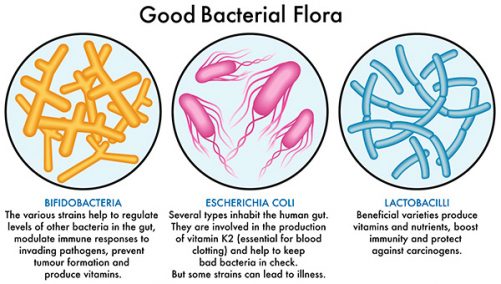What Really Goes on Inside Your Gut?
There's a lot of work going on inside your gut, and those bacteria need the right nutrition and a healthy lifestyle too!
If you’re like most people, you probably don’t give much thought to your digestive tract unless something’s not working right. Like when you’re on a vacation in Mexico, and you realize you ate or drank something that you probably shouldn’t have. Or when you have a stomach bug and have to be on that banana, rice, applesauce and tea diet because everything else is going right through you.
Our gastrointestinal tract (AKA – gut) is an amazing thing. No matter what we put into it, it digests it, absorbs what it needs, sends the nutrients off to the right places so that we can keep on going, and gets rid of the rest. That’s not all it does though!
There’s a world of hard-working bacteria in there
Researchers now know that there are over 1,000 different types of bacteria living in our gut, and trillions of individual cells that reside in the large intestine alone. Collectively, these bacteria are known as the microbiome, and they’re the good kind of bacteria. Why in the world do we need bacteria, you ask? Well, it turns out that these good bacteria play just as important of a role in our health as a healthy diet and lifestyle does.

- They help to produce some our vitamins
- They produce nutrients for the cells in our large intestine
- They help to maintain the lining of our intestines so stuff doesn’t leak out and bad bacteria can’t get in
- They help to boost our immune system and maintain good health
In fact, it turns out that most of our body’s immune system is in our gut, and when our microbiome is out of balance – something called dysbiosis, we’re more prone to diseases and conditions such as irritable bowel, chronic constipation or diarrhea, Crohn’s disease, colitis, colon cancer, various allergies, autoimmune diseases, and even insulin resistance, diabetes and obesity.
A few things that cause dysbiosis are long term antibiotic use, certain environmental triggers, stress, and, you guessed it – a poor diet.
How to keep your microbiome happy
- Luckily, your microbiome likes the same kind of a diet as the rest of your body – lots of fruits, vegetables, and high fiber whole grains. Increasing the variety of these kinds of foods also increases the variety of your microbiome, and more variety, or diversity in the types of bacteria is better.
- Some research studies have shown that your gut microbiome will be more diverse if you eat a lower calorie diet. Excess calories over time destroys the diversity.
- Make sure you get a good 8 hours of sleep, and work on reducing stress if necessary. Your microbiome doesn’t like to be stressed or tired.
- Inoculate! Eating a good dose of probiotics every day helps to keep your bacteria flourishing. Probiotics are the live, active cultures you find in foods like yogurt, kefir, sauerkraut, kimchee, and kombucha. Eat some every day!
- If you’re not eating probiotic-rich foods regularly, take a probiotic supplement. For the most bang for your buck, make sure it has a variety of bacteria strains (each one is good for a different aspect of good health), and make sure you store it properly. Some, like the lactobacillus cultures need to be refrigerated and used fairly quickly, while others can be stored for longer periods of time, and don’t require refrigeration. Always read the label, and follow dosing instructions. This guide from Reviews.com has some good information about the benefits of the different strains of probiotics, and what to look for in a supplement.
[bctt tweet="There's a lot more going on in your gut than you realize! Learn how to take care of it. #GutHealth #Probiotics" username=""]
Probiotics are usually safe for healthy individuals to take, but if you have any health condition which causes a compromised immune system, check with your doctor, as probiotic supplements are generally not recommended.
What do you do for a healthier gut?
Eat well!
